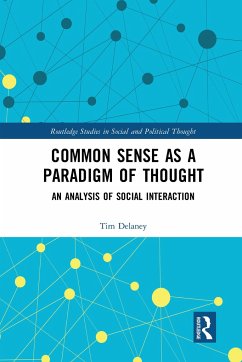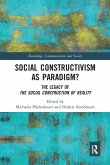- Broschiertes Buch
- Merkliste
- Auf die Merkliste
- Bewerten Bewerten
- Teilen
- Produkt teilen
- Produkterinnerung
- Produkterinnerung
The notion of common sense and abiding by its implications is something that, seemingly, everyone agrees is a good way of making behavioral decisions and conducting one's daily activities. This holds true whether one is a liberal, moderate, or conservative; young or old; and regardless of one's race and ethnicity, gender, or sexual orientation. If utilizing common sense is such a good idea, why then, do so many people seem to violate it? This is just one of many significant questions surrounding the idea of common sense explored and discussed in this book. This volume presents common sense as…mehr
Andere Kunden interessierten sich auch für
![Social Constructivism as Paradigm? Social Constructivism as Paradigm?]() Social Constructivism as Paradigm?61,99 €
Social Constructivism as Paradigm?61,99 €![Paradigm Pulse Paradigm Pulse]() Jens JerndalParadigm Pulse19,99 €
Jens JerndalParadigm Pulse19,99 €![The Thought of Bernard Stiegler The Thought of Bernard Stiegler]() Ross AbbinnettThe Thought of Bernard Stiegler65,99 €
Ross AbbinnettThe Thought of Bernard Stiegler65,99 €![The EU's Common Commercial Policy The EU's Common Commercial Policy]() Manfred ElsigThe EU's Common Commercial Policy57,99 €
Manfred ElsigThe EU's Common Commercial Policy57,99 €![Law And Regulation Of Common Carriers In The Communications Industry Law And Regulation Of Common Carriers In The Communications Industry]() Daniel BrennerLaw And Regulation Of Common Carriers In The Communications Industry65,99 €
Daniel BrennerLaw And Regulation Of Common Carriers In The Communications Industry65,99 €![Recent Developments in European Thought Recent Developments in European Thought]() VariousRecent Developments in European Thought25,99 €
VariousRecent Developments in European Thought25,99 €![Modes of Thought Modes of Thought]() Modes of Thought37,99 €
Modes of Thought37,99 €-
-
-
The notion of common sense and abiding by its implications is something that, seemingly, everyone agrees is a good way of making behavioral decisions and conducting one's daily activities. This holds true whether one is a liberal, moderate, or conservative; young or old; and regardless of one's race and ethnicity, gender, or sexual orientation. If utilizing common sense is such a good idea, why then, do so many people seem to violate it? This is just one of many significant questions surrounding the idea of common sense explored and discussed in this book. This volume presents common sense as a 'paradigm of thought' and as such, compares it to other major categories of thought - tradition, faith, enlightened and rational. Combining a balance of practical, everyday approaches (through the use of popular culture references and featured boxes) and academic analysis of core and conceptual methodological issues, Delaney demonstrates: ¿ The limitations of common sense and its place in everyday social interactions How we learn about common sense Why common sense is so important ¿ Common Sense as a Paradigm of Thought introduces readers to a rich variety of sociological authors and will appeal to students and researchers interested in fields such as: sociology, philosophy, social psychology, cultural studies, communications and health studies. ¿ ¿
Hinweis: Dieser Artikel kann nur an eine deutsche Lieferadresse ausgeliefert werden.
Hinweis: Dieser Artikel kann nur an eine deutsche Lieferadresse ausgeliefert werden.
Produktdetails
- Produktdetails
- Verlag: Routledge
- Seitenzahl: 266
- Erscheinungstermin: 30. Juni 2020
- Englisch
- Abmessung: 234mm x 156mm x 14mm
- Gewicht: 409g
- ISBN-13: 9780367583101
- ISBN-10: 0367583100
- Artikelnr.: 69891279
- Herstellerkennzeichnung
- Libri GmbH
- Europaallee 1
- 36244 Bad Hersfeld
- gpsr@libri.de
- Verlag: Routledge
- Seitenzahl: 266
- Erscheinungstermin: 30. Juni 2020
- Englisch
- Abmessung: 234mm x 156mm x 14mm
- Gewicht: 409g
- ISBN-13: 9780367583101
- ISBN-10: 0367583100
- Artikelnr.: 69891279
- Herstellerkennzeichnung
- Libri GmbH
- Europaallee 1
- 36244 Bad Hersfeld
- gpsr@libri.de
Tim Delaney is a professor of sociology at the State University of New York at Oswego, USA
Chapter 1: An Introduction to the Notion of Common Sense
Introductory Story
It's a Matter of Common Sense
To Purchase
Or Not to Purchase: Which Option is Common Sense?
Is the Earth Flat or Round: What Does Common Sense Tell Us?
Staring at the Sun: Common Sense Tells Us Not to Do It (Even if there is a Rare Eclipse)
The Study of Common Sense: A Focus on the Everyday Interactions of Individuals
Popular Culture Box 1: Learning Common Sense from Popular Culture
Chapter 2: Common Sense as a Paradigm of Thought
Introductory Story
Paradigms of Thought: How Social Order Should Be Structured
Tradition
Tradition: The First Paradigm of Thought
Ancient Traditions
Middle Ages Traditions
Modern Traditions
Faith
Faith: The Second Paradigm of Thought
Religion
Past Monarchies
Royalty
and the Divine Rights of Kings
Modern Monarchies
Enlightened
Rational Thought
Enlightened
Rational Thought: The Third Paradigm of Thought
The Age of Enlightenment
Science and Technology in the Contemporary Era
The Conservative Reaction to Enlightened
Rational Thought
Common Sense
Common Sense: The Fourth Paradigm of Thought
Popular Culture Box 2: "How Can Scientific Truth Be Hearsay?"-Dr. Zira
chimpanzee animal psychologist from the original Planet of the Apes (1968)
Chapter 3: Explaining Common Sense: From the Ancient Greeks to the Early Twentieth Century
Introductory Story
Examining Common Sense
The Ancient Greeks and Modern Philosophy: Common Sense and Skepticism
Ancient Greek Skepticism
Modern Philosophy and Skepticism: Rene Descartes and David Hume
Thomas Reid and Common Sense
G.E. Moore: Refutation of Skepticism and the Promotion of Common Sense
Bertrand Russell and Common Sense
Thomas Paine and Common Sense
Karl Marx
Conflict Theory and Common Sense
Max Weber
Rationality and Common Sense
C. Wright Mills
Situated Actions and Vocabularies of Motives and Common Sense
Symbolic Interactionism
Social Action and Common Sense
William James
Pragmatism
Habits
and Consciousness
Charles Horton Cooley
Symbols
Language
and Social Interaction
George Herbert Mead
Pragmatism
the Social Act
Gestures
and Language
Herbert Blumer
Meanings
Language
Gestures
and Social Action
Erving Goffman
The Presentation of Self and Common Sense
Phenomenology and Common Sense
Edmund Husserl
The Rudiments of Common Sense
Alfred Schutz
The Life-World
Stocks of Knowledge and Common Sense
Peter Berger
The Social Construction of Reality and Common Sense
Ethnomethodology and the Commonsense World
Harold Garfinkel
Taken-for-Granted World
Accounts and the Commonsense World
Popular Culture Box 3: "The Heresy of Heresies was Common Sense"-George Orwell
Nineteen Eighty-Four
Chapter 4: Explaining Common Sense: From the Early Twentieth Century to the Postmodern Era
Contemporary Scholarship in the Study of Common Sense
Hermeneutic Phenomenology and Common Sense
Martin Heidegger
Hans-Georg Gadamer
Paul Ricoeur
Cornelius Castoriadis
Antonio Gramsci and Common Sense
Jurgen Habermas and Common Sense
Immanuel Wallerstein and Common Sense
Anthony Giddens
Structuration Theory and Common Sense
Randall Collins
Interaction Ritual Chains and Common Sense
McDonnell
Bail and Tavory
Resonance Theory and Common Sense
Feminism and Post-feminism and Common Sense
Postmodernism and Common Sense
Posthumanism and Transhumanism
Postcolonialism
Popular Culture Box 4: Posthumanism and the Rise of Machines
Chapter 5: Learning About and Adhering to Common Sense
Introductory Story
Common Sense Is Learned Behavior
The Socialization Process: A Critical Aspect of Learning About Common Sense
Primary Groups
Agents of Socialization
Cyber Socialization and Social Media
Observation and Personal Experience
The Development of Enlightened Rational Thought and Reason
Social Theoretical Explanations on How We Learn and Common Sense
Social Learning Theory
Symbolic Interactionism
Subcultural Theory
Anomie/Strain Theory
Differential Association Theory
Labeling Theory
Control/Social Bond Theory
Adhering to Common Sense
Common Sense
Common
Common Sense
Popular Culture Box 5: "Robots Lack Common Sense
But They Will Shape Future Employment"
Chapter 6: Violating Common Sense: Uncommon Sense
Introductory Story
Impediments to Common Sense:
Failure to Learn
The Lack of a Formal Higher Education
Overly Emotional and Irrational Fear
Believing in Weird Things: Pseudoscience
Superstitions and Other Oddities
Ignorance and Stupidity
People Doing Dumb and Stupid Things: The Award Goes To...
Darwin Awards
Stella Awards
Dumb Criminals
Not Adhering to Common Sense
Uncommon Sense: It's Bad for Our Health
Common
Uncommon Sense
Popular Culture Box 6: "If Seemingly Every Decision You Make in Life Turns Out to Be a Matter of Uncommon Sense
Do the Opposite!"
Chapter 7: Can Common Sense Rise as the Prevailing Paradigm of Thought?
Introductory Story
Common Sense in Review
The Limitations of Common Sense
Enlightened
Rational Thought Should be the Prevailing Paradigm of Thought
Popular Culture Box 7: "Testing Your Common Sense".
Introductory Story
It's a Matter of Common Sense
To Purchase
Or Not to Purchase: Which Option is Common Sense?
Is the Earth Flat or Round: What Does Common Sense Tell Us?
Staring at the Sun: Common Sense Tells Us Not to Do It (Even if there is a Rare Eclipse)
The Study of Common Sense: A Focus on the Everyday Interactions of Individuals
Popular Culture Box 1: Learning Common Sense from Popular Culture
Chapter 2: Common Sense as a Paradigm of Thought
Introductory Story
Paradigms of Thought: How Social Order Should Be Structured
Tradition
Tradition: The First Paradigm of Thought
Ancient Traditions
Middle Ages Traditions
Modern Traditions
Faith
Faith: The Second Paradigm of Thought
Religion
Past Monarchies
Royalty
and the Divine Rights of Kings
Modern Monarchies
Enlightened
Rational Thought
Enlightened
Rational Thought: The Third Paradigm of Thought
The Age of Enlightenment
Science and Technology in the Contemporary Era
The Conservative Reaction to Enlightened
Rational Thought
Common Sense
Common Sense: The Fourth Paradigm of Thought
Popular Culture Box 2: "How Can Scientific Truth Be Hearsay?"-Dr. Zira
chimpanzee animal psychologist from the original Planet of the Apes (1968)
Chapter 3: Explaining Common Sense: From the Ancient Greeks to the Early Twentieth Century
Introductory Story
Examining Common Sense
The Ancient Greeks and Modern Philosophy: Common Sense and Skepticism
Ancient Greek Skepticism
Modern Philosophy and Skepticism: Rene Descartes and David Hume
Thomas Reid and Common Sense
G.E. Moore: Refutation of Skepticism and the Promotion of Common Sense
Bertrand Russell and Common Sense
Thomas Paine and Common Sense
Karl Marx
Conflict Theory and Common Sense
Max Weber
Rationality and Common Sense
C. Wright Mills
Situated Actions and Vocabularies of Motives and Common Sense
Symbolic Interactionism
Social Action and Common Sense
William James
Pragmatism
Habits
and Consciousness
Charles Horton Cooley
Symbols
Language
and Social Interaction
George Herbert Mead
Pragmatism
the Social Act
Gestures
and Language
Herbert Blumer
Meanings
Language
Gestures
and Social Action
Erving Goffman
The Presentation of Self and Common Sense
Phenomenology and Common Sense
Edmund Husserl
The Rudiments of Common Sense
Alfred Schutz
The Life-World
Stocks of Knowledge and Common Sense
Peter Berger
The Social Construction of Reality and Common Sense
Ethnomethodology and the Commonsense World
Harold Garfinkel
Taken-for-Granted World
Accounts and the Commonsense World
Popular Culture Box 3: "The Heresy of Heresies was Common Sense"-George Orwell
Nineteen Eighty-Four
Chapter 4: Explaining Common Sense: From the Early Twentieth Century to the Postmodern Era
Contemporary Scholarship in the Study of Common Sense
Hermeneutic Phenomenology and Common Sense
Martin Heidegger
Hans-Georg Gadamer
Paul Ricoeur
Cornelius Castoriadis
Antonio Gramsci and Common Sense
Jurgen Habermas and Common Sense
Immanuel Wallerstein and Common Sense
Anthony Giddens
Structuration Theory and Common Sense
Randall Collins
Interaction Ritual Chains and Common Sense
McDonnell
Bail and Tavory
Resonance Theory and Common Sense
Feminism and Post-feminism and Common Sense
Postmodernism and Common Sense
Posthumanism and Transhumanism
Postcolonialism
Popular Culture Box 4: Posthumanism and the Rise of Machines
Chapter 5: Learning About and Adhering to Common Sense
Introductory Story
Common Sense Is Learned Behavior
The Socialization Process: A Critical Aspect of Learning About Common Sense
Primary Groups
Agents of Socialization
Cyber Socialization and Social Media
Observation and Personal Experience
The Development of Enlightened Rational Thought and Reason
Social Theoretical Explanations on How We Learn and Common Sense
Social Learning Theory
Symbolic Interactionism
Subcultural Theory
Anomie/Strain Theory
Differential Association Theory
Labeling Theory
Control/Social Bond Theory
Adhering to Common Sense
Common Sense
Common
Common Sense
Popular Culture Box 5: "Robots Lack Common Sense
But They Will Shape Future Employment"
Chapter 6: Violating Common Sense: Uncommon Sense
Introductory Story
Impediments to Common Sense:
Failure to Learn
The Lack of a Formal Higher Education
Overly Emotional and Irrational Fear
Believing in Weird Things: Pseudoscience
Superstitions and Other Oddities
Ignorance and Stupidity
People Doing Dumb and Stupid Things: The Award Goes To...
Darwin Awards
Stella Awards
Dumb Criminals
Not Adhering to Common Sense
Uncommon Sense: It's Bad for Our Health
Common
Uncommon Sense
Popular Culture Box 6: "If Seemingly Every Decision You Make in Life Turns Out to Be a Matter of Uncommon Sense
Do the Opposite!"
Chapter 7: Can Common Sense Rise as the Prevailing Paradigm of Thought?
Introductory Story
Common Sense in Review
The Limitations of Common Sense
Enlightened
Rational Thought Should be the Prevailing Paradigm of Thought
Popular Culture Box 7: "Testing Your Common Sense".
Chapter 1: An Introduction to the Notion of Common Sense
Introductory Story
It's a Matter of Common Sense
To Purchase
Or Not to Purchase: Which Option is Common Sense?
Is the Earth Flat or Round: What Does Common Sense Tell Us?
Staring at the Sun: Common Sense Tells Us Not to Do It (Even if there is a Rare Eclipse)
The Study of Common Sense: A Focus on the Everyday Interactions of Individuals
Popular Culture Box 1: Learning Common Sense from Popular Culture
Chapter 2: Common Sense as a Paradigm of Thought
Introductory Story
Paradigms of Thought: How Social Order Should Be Structured
Tradition
Tradition: The First Paradigm of Thought
Ancient Traditions
Middle Ages Traditions
Modern Traditions
Faith
Faith: The Second Paradigm of Thought
Religion
Past Monarchies
Royalty
and the Divine Rights of Kings
Modern Monarchies
Enlightened
Rational Thought
Enlightened
Rational Thought: The Third Paradigm of Thought
The Age of Enlightenment
Science and Technology in the Contemporary Era
The Conservative Reaction to Enlightened
Rational Thought
Common Sense
Common Sense: The Fourth Paradigm of Thought
Popular Culture Box 2: "How Can Scientific Truth Be Hearsay?"-Dr. Zira
chimpanzee animal psychologist from the original Planet of the Apes (1968)
Chapter 3: Explaining Common Sense: From the Ancient Greeks to the Early Twentieth Century
Introductory Story
Examining Common Sense
The Ancient Greeks and Modern Philosophy: Common Sense and Skepticism
Ancient Greek Skepticism
Modern Philosophy and Skepticism: Rene Descartes and David Hume
Thomas Reid and Common Sense
G.E. Moore: Refutation of Skepticism and the Promotion of Common Sense
Bertrand Russell and Common Sense
Thomas Paine and Common Sense
Karl Marx
Conflict Theory and Common Sense
Max Weber
Rationality and Common Sense
C. Wright Mills
Situated Actions and Vocabularies of Motives and Common Sense
Symbolic Interactionism
Social Action and Common Sense
William James
Pragmatism
Habits
and Consciousness
Charles Horton Cooley
Symbols
Language
and Social Interaction
George Herbert Mead
Pragmatism
the Social Act
Gestures
and Language
Herbert Blumer
Meanings
Language
Gestures
and Social Action
Erving Goffman
The Presentation of Self and Common Sense
Phenomenology and Common Sense
Edmund Husserl
The Rudiments of Common Sense
Alfred Schutz
The Life-World
Stocks of Knowledge and Common Sense
Peter Berger
The Social Construction of Reality and Common Sense
Ethnomethodology and the Commonsense World
Harold Garfinkel
Taken-for-Granted World
Accounts and the Commonsense World
Popular Culture Box 3: "The Heresy of Heresies was Common Sense"-George Orwell
Nineteen Eighty-Four
Chapter 4: Explaining Common Sense: From the Early Twentieth Century to the Postmodern Era
Contemporary Scholarship in the Study of Common Sense
Hermeneutic Phenomenology and Common Sense
Martin Heidegger
Hans-Georg Gadamer
Paul Ricoeur
Cornelius Castoriadis
Antonio Gramsci and Common Sense
Jurgen Habermas and Common Sense
Immanuel Wallerstein and Common Sense
Anthony Giddens
Structuration Theory and Common Sense
Randall Collins
Interaction Ritual Chains and Common Sense
McDonnell
Bail and Tavory
Resonance Theory and Common Sense
Feminism and Post-feminism and Common Sense
Postmodernism and Common Sense
Posthumanism and Transhumanism
Postcolonialism
Popular Culture Box 4: Posthumanism and the Rise of Machines
Chapter 5: Learning About and Adhering to Common Sense
Introductory Story
Common Sense Is Learned Behavior
The Socialization Process: A Critical Aspect of Learning About Common Sense
Primary Groups
Agents of Socialization
Cyber Socialization and Social Media
Observation and Personal Experience
The Development of Enlightened Rational Thought and Reason
Social Theoretical Explanations on How We Learn and Common Sense
Social Learning Theory
Symbolic Interactionism
Subcultural Theory
Anomie/Strain Theory
Differential Association Theory
Labeling Theory
Control/Social Bond Theory
Adhering to Common Sense
Common Sense
Common
Common Sense
Popular Culture Box 5: "Robots Lack Common Sense
But They Will Shape Future Employment"
Chapter 6: Violating Common Sense: Uncommon Sense
Introductory Story
Impediments to Common Sense:
Failure to Learn
The Lack of a Formal Higher Education
Overly Emotional and Irrational Fear
Believing in Weird Things: Pseudoscience
Superstitions and Other Oddities
Ignorance and Stupidity
People Doing Dumb and Stupid Things: The Award Goes To...
Darwin Awards
Stella Awards
Dumb Criminals
Not Adhering to Common Sense
Uncommon Sense: It's Bad for Our Health
Common
Uncommon Sense
Popular Culture Box 6: "If Seemingly Every Decision You Make in Life Turns Out to Be a Matter of Uncommon Sense
Do the Opposite!"
Chapter 7: Can Common Sense Rise as the Prevailing Paradigm of Thought?
Introductory Story
Common Sense in Review
The Limitations of Common Sense
Enlightened
Rational Thought Should be the Prevailing Paradigm of Thought
Popular Culture Box 7: "Testing Your Common Sense".
Introductory Story
It's a Matter of Common Sense
To Purchase
Or Not to Purchase: Which Option is Common Sense?
Is the Earth Flat or Round: What Does Common Sense Tell Us?
Staring at the Sun: Common Sense Tells Us Not to Do It (Even if there is a Rare Eclipse)
The Study of Common Sense: A Focus on the Everyday Interactions of Individuals
Popular Culture Box 1: Learning Common Sense from Popular Culture
Chapter 2: Common Sense as a Paradigm of Thought
Introductory Story
Paradigms of Thought: How Social Order Should Be Structured
Tradition
Tradition: The First Paradigm of Thought
Ancient Traditions
Middle Ages Traditions
Modern Traditions
Faith
Faith: The Second Paradigm of Thought
Religion
Past Monarchies
Royalty
and the Divine Rights of Kings
Modern Monarchies
Enlightened
Rational Thought
Enlightened
Rational Thought: The Third Paradigm of Thought
The Age of Enlightenment
Science and Technology in the Contemporary Era
The Conservative Reaction to Enlightened
Rational Thought
Common Sense
Common Sense: The Fourth Paradigm of Thought
Popular Culture Box 2: "How Can Scientific Truth Be Hearsay?"-Dr. Zira
chimpanzee animal psychologist from the original Planet of the Apes (1968)
Chapter 3: Explaining Common Sense: From the Ancient Greeks to the Early Twentieth Century
Introductory Story
Examining Common Sense
The Ancient Greeks and Modern Philosophy: Common Sense and Skepticism
Ancient Greek Skepticism
Modern Philosophy and Skepticism: Rene Descartes and David Hume
Thomas Reid and Common Sense
G.E. Moore: Refutation of Skepticism and the Promotion of Common Sense
Bertrand Russell and Common Sense
Thomas Paine and Common Sense
Karl Marx
Conflict Theory and Common Sense
Max Weber
Rationality and Common Sense
C. Wright Mills
Situated Actions and Vocabularies of Motives and Common Sense
Symbolic Interactionism
Social Action and Common Sense
William James
Pragmatism
Habits
and Consciousness
Charles Horton Cooley
Symbols
Language
and Social Interaction
George Herbert Mead
Pragmatism
the Social Act
Gestures
and Language
Herbert Blumer
Meanings
Language
Gestures
and Social Action
Erving Goffman
The Presentation of Self and Common Sense
Phenomenology and Common Sense
Edmund Husserl
The Rudiments of Common Sense
Alfred Schutz
The Life-World
Stocks of Knowledge and Common Sense
Peter Berger
The Social Construction of Reality and Common Sense
Ethnomethodology and the Commonsense World
Harold Garfinkel
Taken-for-Granted World
Accounts and the Commonsense World
Popular Culture Box 3: "The Heresy of Heresies was Common Sense"-George Orwell
Nineteen Eighty-Four
Chapter 4: Explaining Common Sense: From the Early Twentieth Century to the Postmodern Era
Contemporary Scholarship in the Study of Common Sense
Hermeneutic Phenomenology and Common Sense
Martin Heidegger
Hans-Georg Gadamer
Paul Ricoeur
Cornelius Castoriadis
Antonio Gramsci and Common Sense
Jurgen Habermas and Common Sense
Immanuel Wallerstein and Common Sense
Anthony Giddens
Structuration Theory and Common Sense
Randall Collins
Interaction Ritual Chains and Common Sense
McDonnell
Bail and Tavory
Resonance Theory and Common Sense
Feminism and Post-feminism and Common Sense
Postmodernism and Common Sense
Posthumanism and Transhumanism
Postcolonialism
Popular Culture Box 4: Posthumanism and the Rise of Machines
Chapter 5: Learning About and Adhering to Common Sense
Introductory Story
Common Sense Is Learned Behavior
The Socialization Process: A Critical Aspect of Learning About Common Sense
Primary Groups
Agents of Socialization
Cyber Socialization and Social Media
Observation and Personal Experience
The Development of Enlightened Rational Thought and Reason
Social Theoretical Explanations on How We Learn and Common Sense
Social Learning Theory
Symbolic Interactionism
Subcultural Theory
Anomie/Strain Theory
Differential Association Theory
Labeling Theory
Control/Social Bond Theory
Adhering to Common Sense
Common Sense
Common
Common Sense
Popular Culture Box 5: "Robots Lack Common Sense
But They Will Shape Future Employment"
Chapter 6: Violating Common Sense: Uncommon Sense
Introductory Story
Impediments to Common Sense:
Failure to Learn
The Lack of a Formal Higher Education
Overly Emotional and Irrational Fear
Believing in Weird Things: Pseudoscience
Superstitions and Other Oddities
Ignorance and Stupidity
People Doing Dumb and Stupid Things: The Award Goes To...
Darwin Awards
Stella Awards
Dumb Criminals
Not Adhering to Common Sense
Uncommon Sense: It's Bad for Our Health
Common
Uncommon Sense
Popular Culture Box 6: "If Seemingly Every Decision You Make in Life Turns Out to Be a Matter of Uncommon Sense
Do the Opposite!"
Chapter 7: Can Common Sense Rise as the Prevailing Paradigm of Thought?
Introductory Story
Common Sense in Review
The Limitations of Common Sense
Enlightened
Rational Thought Should be the Prevailing Paradigm of Thought
Popular Culture Box 7: "Testing Your Common Sense".








